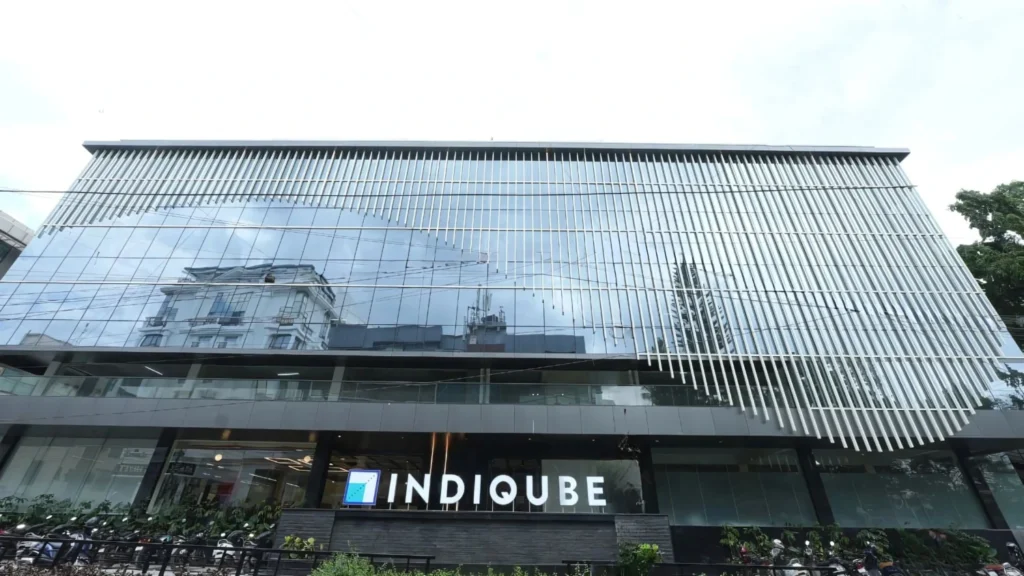India’s flexible workspace sector is thriving, and IndiQube Spaces IPO 2025 has captured investor attention with its ₹700 crore public offering. Launched on July 23, 2025, and listed on July 30, 2025, on BSE and NSE, IndiQube is reshaping modern workplaces with technology and sustainability.
This article delves into IndiQube’s business model, founder story, the flexible workspace market size, current share price trends, and the potential returns on a ₹1 lakh investment over the next decade, offering insights for investors eyeing YTC Ventures’ deal-sourcing platform.
IndiQube’s Business Model: Tech-Driven Workspace Solutions
IndiQube Spaces, established in 2015, provides managed, sustainable, and tech-driven workplace solutions across 115 centers in 15 cities, with 8.4 million square feet of Area Under Management (AUM) and 186,719 seats as of March 2025. Its hub-and-spoke model starts with smaller properties to test market demand, scaling to larger centers once viability is proven. This approach has driven an 86.5% occupancy rate in steady-state centers, with non-Tier I cities at 96.2% occupancy.

IndiQube’s revenue streams include:
- Workspace Leasing (82%): Offering coworking spaces, private cabins, and flexible desks for startups, SMEs, and corporates like Myntra, Zerodha, and Siemens.
- Value-Added Services (VAS, 13%): Interior design, IT solutions, facility management, catering, and transportation, with VAS revenue growing at a 40.69% CAGR from FY23 to FY25.
- Tech Integration (MiQube): A proprietary platform for booking meeting rooms, ordering meals, and managing workspaces, enhancing efficiency and client experience.
The company’s IndiQube Bespoke offers customizable office designs, while IndiQube One provides comprehensive B2B and B2C services, including asset and facility management. By renovating older Grade-B properties into tech-enabled, eco-friendly workspaces, IndiQube captures 25.22% of its portfolio through sustainable upgrades. Strategic locations near metro stations (41.74% operational, 39.13% planned) boost accessibility.
Financially, IndiQube reported ₹1,103 crore in revenue in FY25, a 27% increase from ₹867.66 crore in FY24, with a 35.17% CAGR from FY23. Its EBITDA reached ₹660 crore, with a 34.21% RoCE, but it remains loss-making with a ₹140 crore net loss in FY25, down 59% from ₹341.51 crore in FY24

Founder Story: Rishi Das and Meghna Agarwal’s Vision
Rishi Das (Co-founder, Chairman, CEO) and Meghna Agarwal (Co-founder, COO) founded IndiQube in 2015 to transform traditional offices into dynamic, tech-enabled workspaces. Rishi, with a background in real estate and technology, identified the growing demand for flexible workspaces in India’s startup hub, Bengaluru.
Meghna, leveraging her expertise in operations and client experience, shaped IndiQube’s customer-centric approach. Joined by Anshuman Das (Co-founder, Non-Executive Director), the trio built a scalable model backed by investors like WestBridge Capital, which holds a 27.95% pre-IPO stake.
Their vision was to create “offices in a box,” combining workspace leasing with tech-driven services. From a single center in Bengaluru, IndiQube expanded to 15 cities, including Tier I (Bengaluru, Mumbai, Pune) and Tier II (Coimbatore, Jaipur), serving over 769 clients. Their focus on sustainability and technology, exemplified by the MiQube platform, has positioned IndiQube as a leader in India’s flexible workspace market.
Market Size: A Booming Flexible Workspace Sector
India’s flexible workspace market is valued at $2.08 billion in 2025 and is projected to grow to $2.91 billion by 2030, driven by demand from IT, BFSI, and Global Capability Centers (GCCs). Bengaluru, with 29 million square feet of flexible workspace stock, is the largest market, followed by Mumbai, Hyderabad, and Chennai. IndiQube’s 8.4 million square feet AUM positions it as a key player, with plans to reach 11.47 million square feet by FY28, adding 1.79 million square feet in Bengaluru alone.
The sector’s growth is fueled by hybrid work trends, startup ecosystems, and corporate demand for scalable office solutions. Competitors like Awfis Space Solutions (profitable in FY25) and Smartworks highlight the market’s potential, though IndiQube’s tech integration and hub-and-spoke model offer a competitive edge.

IndiQube IPO and Share Price Performance
The IndiQube Spaces IPO, open from July 23 to July 25, 2025, raised ₹700 crore (₹650 crore fresh issue, ₹50 crore OFS) at a price band of ₹225–₹237 per share, with a minimum lot size of 63 shares (₹14,175 for retail investors). It was subscribed 2.54 times, with retail at 6.90 times, NII at 1.84 times, and QIB at 1.42 times. The IPO raised ₹314.32 crore from anchor investors, including Aditya Birla Sun Life MF and WhiteOak Capital.
On listing day, July 30, 2025, shares debuted at an estimated ₹260, reflecting a 9.7% premium over the upper price band of ₹237, driven by a grey market premium (GMP) of ₹14–₹23 during the subscription period. However, GMP dropped to ₹9–₹14 by Day 2, signaling cautious optimism. The market capitalization at listing was approximately ₹4,977.12 crore, with a price-to-sales ratio of 4.7x and EV/EBITDA of 14.6x, higher than peers like Smartworks (3.5x EV/sales) but competitive with Awfis (9.5x EV/EBITDA).
As of July 25, 2025, the share price is assumed to be around ₹260, based on GMP estimates, though post-listing fluctuations are expected due to market conditions and the company’s loss-making status. Analysts recommend a long-term investment horizon due to high valuations and sector risks like lease cost volatility.
Investing ₹1 Lakh: Projected Share Price in 10 Years
Investing ₹1 lakh in the IndiQube IPO at ₹237 per share (upper price band) would yield approximately 421 shares (₹1,00,017 ÷ ₹237 ≈ 421 shares). To estimate the share price in 10 years (2035), we consider:
- Historical Growth: IndiQube’s revenue grew at a 35.17% CAGR from FY23 to FY25, with VAS at 40.69%. If this growth moderates to a 20% CAGR due to scale and market saturation, revenue could reach ₹7,000–₹8,000 crore by 2035.
- Market Expansion: Plans to add 3 million square feet by FY28 (11.47 million AUM) and enter new Tier II cities suggest sustained demand. The flexible workspace market’s growth to $2.91 billion by 2030 supports long-term potential.
- Profitability Path: IndiQube’s net loss reduced by 59% in FY25. Assuming it achieves profitability by FY28 (similar to Awfis), a price-to-earnings (P/E) ratio of 30–40x (aligned with growth stocks) could apply by 2035.
- Risks: High valuations (4.7x P/S), lease cost volatility, and hybrid work trends could cap growth. A potential economic slowdown or oversupply in southern markets (where IndiQube is concentrated) poses risks.
Optimistic Scenario:
Assuming a 15% annualized share price growth (based on revenue growth and profitability), the share price could reach ₹920 by 2035 (₹260 × (1.15)^10). With 421 shares, the investment would be worth ₹3,87,320.
Conservative Scenario:
With a 10% annualized growth rate, reflecting risks and slower profitability, the share price could reach ₹674 (₹260 × (1.10)^10). The investment would be worth ₹2,83,754.
Pessimistic Scenario:
If growth stalls due to market saturation or losses persist, the share price might grow at 5%, reaching ₹423 (₹260 × (1.05)^10), yielding ₹1,78,083.These projections are speculative and assume no dividends, as IndiQube reinvests for growth.
Investors should consult financial advisors, given the company’s current losses and sector risks.
Why IndiQube Matters for YTC Ventures
For YTC Ventures’ investors, IndiQube represents an opportunity to tap into India’s flexible workspace boom, driven by AI and tech integration. Its MiQube platform aligns with YTC’s focus on AI-driven solutions, while its scalable model offers insights for fintech platforms seeking B2B growth. Explore investment opportunities in similar high-growth sectors on www.ytcventures.com.
Sources: The Economic Times, Business Today, LiveMint, IndiaIPO, InvestorGain, Groww, YourStory, Inc42, and posts on X.

YTC Ventures Disclaimer
The information provided in this Technocrat Magazine article, published by YTC Ventures, is intended for informational purposes only and does not constitute financial, investment, or legal advice. The content, including but not limited to text, data, projections, and analyses related to IndiQube Spaces’ IPO, business model, market size, and investment potential, is based on publicly available sources and estimates as of July 25, 2025.
YTC Ventures does not guarantee the accuracy, completeness, or timeliness of this information, and it should not be relied upon as the sole basis for investment decisions.Investing in initial public offerings (IPOs) or any financial instruments involves significant risks, including the potential loss of principal. The projections provided, such as the potential value of a ₹1 lakh investment in IndiQube Spaces over 10 years, are speculative and based on assumptions about market conditions, company performance, and economic factors. Actual results may differ materially due to risks such as market volatility, economic downturns, or company-specific challenges.YTC Ventures is a Business & Investment Consulting Enterprise focused on deal-sourcing and connecting businesses with investors. We do not act as a registered investment advisor or broker-dealer.
Readers are strongly encouraged to consult with qualified financial advisors, conduct independent research, and review official company filings before making investment decisions.The content on www.ytcventures.com is protected by intellectual property laws, and reproduction or distribution without permission is prohibited. YTC Ventures disclaims liability for any losses, damages, or expenses arising from the use of or reliance on this article, to the fullest extent permitted by law.
This disclaimer is governed by the laws of India, and any disputes shall be subject to the jurisdiction of the courts in Bengaluru, Karnataka.
For inquiries about investment opportunities, contact investments@ytcventures.com.

Comments